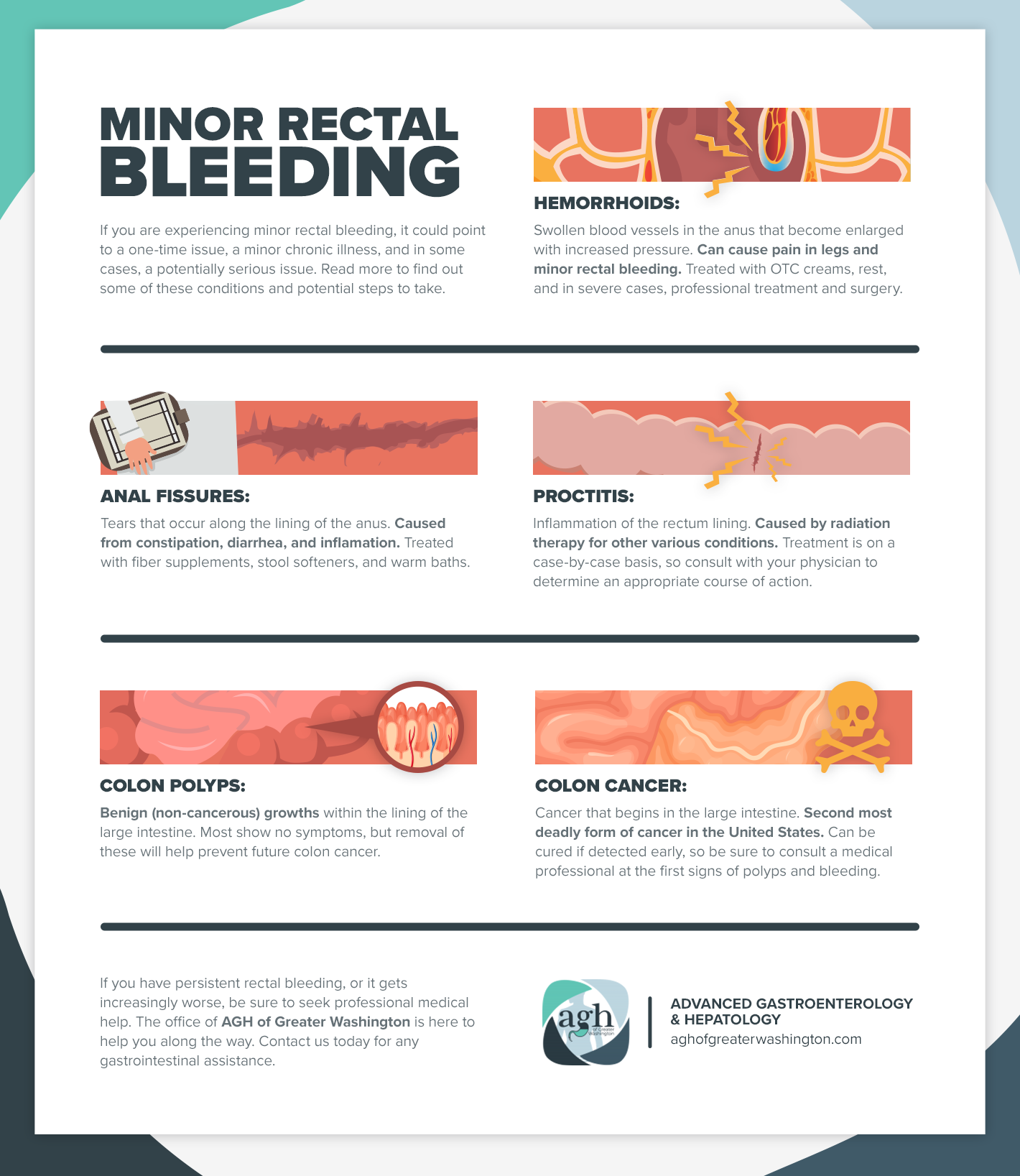
Minor rectal bleeding refers to the passage of a few drops of bright red (fresh) blood from the rectum, which may appear on the stool, on the toilet paper or in the toilet bowl.
This brochure addresses minor rectal bleeding that occurs from time to time. Continuous passage of significantly greater amounts of blood from the rectum or stools that appear black, tarry, or maroon in color can be caused by other diseases that will not be discussed here. Call your doctor immediately if these more serious conditions occur. Because there are several possible causes for minor rectal bleeding, a complete evaluation and early diagnosis by your doctor is very important. Rectal bleeding, whether it is minor or not, can be a symptom of colon cancer, a type of cancer that can be cured if detected early.
What are hemorrhoids?
Hemorrhoids (also called piles) are swollen blood vessels in the anus and rectum that become engorged from increased pressure, similar to what occurs in varicose veins in the legs. Hemorrhoids can either be internal (inside the anus) or external (under the skin around the anus). Hemorrhoids are the most common cause of minor rectal bleeding, and are typically not associated with pain. Bleeding from hemorrhoids is usually associated with bowel movements, or it may also stain the toilet paper with blood. The exact cause of bleeding from hemorrhoids is not known, but it often seems to be related to constipation, diarrhea, sitting or standing for long periods, obesity, heavy lifting, and pregnancy. Symptoms from hemorrhoids may run in some families. Hemorrhoids are also more common as we get older. Fortunately, this very common condition does not lead to cancer.

Hemorrhoids and rectal polyps are common causes of minor rectal bleeding.
How are hemorrhoids treated?
Medical treatment of hemorrhoids includes treatment of any underlying constipation, taking warm baths, and applying an over-the-counter cream or suppository that may contain hydrocortisone. If medical treatment fails there are a number of ways to reduce the size or eliminate internal hemorrhoids. Each method varies in its success rate, risks, and recovery time. Your doctor will discuss these options with you. Rubber band ligation is the most common outpatient procedure for hemorrhoids in the United States. It involves placing rubber bands around the base of an internal hemorrhoid to cut off its blood supply. This causes the hemorrhoid to shrink, and in a few days both the hemorrhoid and the rubber band fall off during a bowel movement. Possible complications include pain, bleeding, and infection. After band ligation, your doctor may prescribe medications, including pain medication, and stool softeners, before sending you home. Contact your doctor immediately if you notice severe pain, fever, or significant rectal bleeding. Laser or infrared coagulation and sclerotherapy (injection of medicine directly into the hemorrhoids) are also office-based treatment procedures, although they are less common. Surgery to remove hemorrhoids may be required in severe cases or if symptoms persist despite rubber band ligation, coagulation, or sclerotherapy.
What are anal fissures?
Tears that occur in the lining of the anus are called anal fissures. This condition is most commonly caused by constipation and passing hard stools, although it may also result from diarrhea or inflammation in the anus. In addition to causing bleeding from the rectum, anal fissures may also cause a lot of pain during and immediately after bowel movements. Most fissures are treated successfully with simple remedies such as fiber supplements, stool softeners (if constipation is the cause), and warm baths. Your doctor may also prescribe a cream to soothe the inflamed area. Other options for fissures that do not heal with medication include treatment to relax the muscles around the anus (sphincters) or surgery.

In a colonoscopy, the physician passes the endoscope through your rectum and into the colon to examine the tissue of the colon wall for abnormalities such as polyps.
What is proctitis?
Proctitis refers to inflammation of the lining of the rectum. It can be caused by previous radiation therapy for various cancers, medications, infections or a limited form of inflammatory bowel disease (IBD). It may cause the sensation that you didn’t completely empty your bowels after a bowel movement, and may give you the frequent urge to have a bowel movement. Other symptoms include passing mucus through the rectum, rectal bleeding, and pain in the area of the anus and rectum. Treatment for proctitis depends on the cause. Your doctor will discuss the appropriate course of action with you.
What are colon polyps?
Polyps are benign growths within the lining of the large bowel. Although most do not cause symptoms, some polyps located in the lower colon and rectum may cause minor bleeding. It is important to remove these polyps because some of them may later turn into colon cancer if left untreated.
What is colon cancer?

Most colon cancers develop from colon polyps over a period of several years. Therefore, removing colon polyps reduces the risk for colon cancer.
Colon cancer refers to cancer that starts in the large intestine. It can affect both men and women of all ethnic backgrounds and is the second most common cause of cancer deaths in the United States. Fortunately, it is generally a slow-growing cancer that can be cured if detected early. Most colon cancers develop from colon polyps over a period of several years. Therefore, removing colon polyps reduces the risk for colon cancer. Anal cancer is less common but curable when diagnosed early.
What are rectal ulcers?
Solitary rectal ulcer syndrome is an uncommon condition that can affect both men and women, and is associated with long-standing constipation and prolonged straining during bowel movement. In this condition, an area in the rectum (typically in the form of a single ulcer) leads to passing blood and mucus from the rectum. Treatment involves fiber supplements to relieve constipation. For those with significant symptoms, surgery may be required.
How is minor rectal bleeding evaluated?
Your doctor may examine the anus visually to look for anal fissures, cancer or external hemorrhoids, or the doctor may perform an internal examination with a gloved, lubricated finger to feel for abnormalities in the lower rectum and anal canal. If indicated, your doctor may also perform a procedure called colonoscopy. In this procedure, a flexible, lighted tube about the thickness of your finger is inserted into the anus to examine the entire colon. Sedative medications are typically given for colonoscopy to make you sleepy and decrease any discomfort. As an alternative, to evaluate your bleeding, your doctor may recommend a flexible sigmoidoscopy, which uses a shorter tube with a camera to examine the lower colon and rectum. To examine only the lower rectum and anal canal, an anoscope may be used. This very short (3 to 4 inch) tube is especially useful when your doctor suspects hemorrhoids, anal cancer or anal fissures.
What can I do to prevent further rectal bleeding?
This depends on the cause of the rectal bleeding. You should talk to your doctor about your current condition and specific management options and treatments that are available to you — AGH of Greater Washington has offices in Vienna, Virginia as well as Washington DC.
Download this article in PDF format
Don’t have Adobe Reader? Download it here
Have questions? Fill out the form below!
The information AGH supplies on this website should not be used as a substitute to your regular physician’s medical advice. Your research from this website should not be used as a medical diagnosis. Consult your regular physician for diagnoses and treatments. The information found on this website is for educational purposes only. A formal consultation with a surgeon or doctor is needed before pursuing surgical procedures or medical treatments. Individual results may vary.
Gastroenterology Articles
Why is Early Detection So Important?
At Advanced Gastroenterology & Hepatology of Greater Washington, we’re dedicated to changing lives through innovative healthcare solutions. With liver disease affecting one in three Americans and often progressing silently, the importance of early detection cannot be overstated. Our state-of-the-art FibroScan test offers a glimpse into the future of liver health, where invasive procedures are no…
Read MoreWhat’s New at AGH of Greater Washington
At Advanced Gastroenterology & Hepatology of Greater Washington (AGH), we’re dedicated to pioneering health solutions that make a difference in our patients’ lives. With our latest offerings, including Semaglutide and Tirzepatide injections for weight loss, along with advanced FibroScan testing for liver health, we’re setting new standards for medical care in Virginia and Washington D.C.…
Read MoreWhat is FibroScan?
At AGH of Greater Washington, we’re at the forefront of innovative health solutions, consistently integrating advanced diagnostic tools to enhance patient care. A critical component of our services focuses on liver health — a vital aspect often overshadowed until significant symptoms emerge. Enter FibroScan, a groundbreaking liver scan technology that has transformed the landscape of…
Read More
